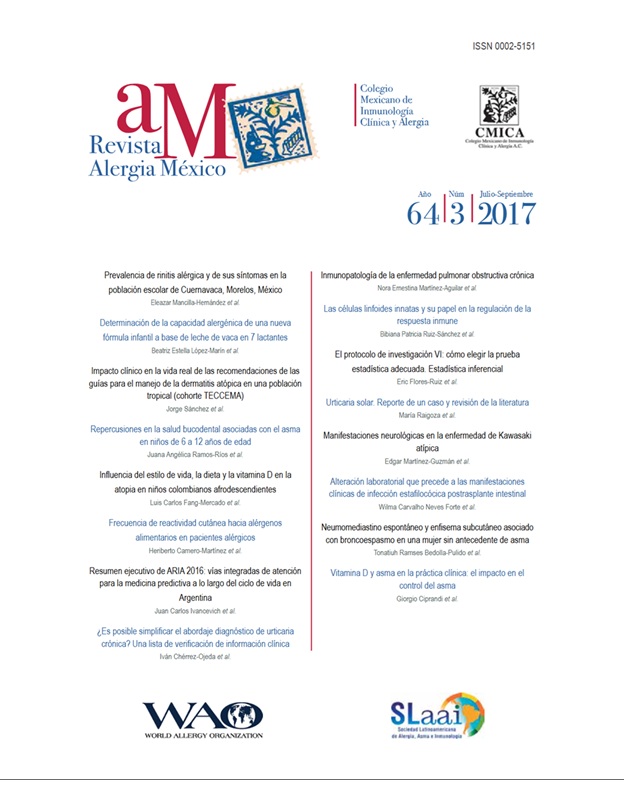Abstract
Background: Spontaneous pneumomediastinum most relevant triggering events are cough, vomiting, nutritional problems, physical activity and use of inhaled drugs. Association of spontaneous pneumomediastinum with non-asthma-related bronchospasm is an infrequent event.
Clinical case: This is the case of a 21-year-old woman without personal or family history of asthma, allergic rhinitis or atopy who during late puerperium had 39 °C fever, paroxysmal cough and chest oppression of sudden onset, as well as wheezing and subcutaneous emphysema of the neck; she had no previous nasal symptoms. Chest X-ray revealed free air in the mediastinum and left lateral side of the neck. Possible cause of the condition was attributed to bronchospasm related to airway infection. Treatment was based on bronchodilators, systemic steroids and supplementary oxygen administration. The symptoms subsided after 48 hours.
Conclusions: In the clinical case herein presented, spontaneous pneumomediastinum precipitating factor appeared to be paroxysmal cough associated with bronchospasm and, hence, we suggest for this entity to be suspected in patients even if there is no previous history of asthma.
References
Hamman L. Spontaneous mediastinal emphysema. Bull Johns Hopkins Hosp. 1939;64(1):1-21.
Panacek EA, Singer AJ, Sherman BW, Prescott A, Rutherford WF. Spontaneous pneumomediastinum: Clinical and natural history. Ann Emerg Med. 1992;21(10):1222-1227. DOI: http://dx.doi.org/10.1016/S0196-0644(05)81750-0
Dionísio P, Martins L, Moreira S, Manique A, Macedo R, Caeiro F, et al. Spontaneous pneumomediastinum: Experience in 18 patients during the last 12 years. J Bras Pneumol. 2017;43(2):101-105. DOI: http://dx.doi.org/10.1590/S1806-37562016000000052
Kim KS, Jeon HW, Moon Y, Kim YD, Ahn MI, Park JK, et al. Clinical experience of spontaneous pneumomediastinum: diagnosis and treatment. J Thorac Dis. 2015;7(10):1817-1824. DOI: http://dx.doi.org/10.3978/j.issn.2072-1439.2015.10.58
Park SJ, Park JY, Jung J, Park SY. Clinical manifestations of spontaneous pneumomediastinum. Korean J Thorac Cardiovasc Surg. 2016;49(4):287-291. DOI: http://dx.doi.org/10.5090/kjtcs.2016.49.4.287
Dajer-Fadel WL, Argüero-Sánchez R, Ibarra-Pérez C, Navarro-Reynoso FP. Systematic review of spontaneous pneumomediastinum: A survey of 22 years data. Asian Cardiovasc Thorac Ann. 2014;22(8):997-1002. DOI: http://dx.doi.org/10.1177/0218492313504091
Baumann MH, Sahn SA. Hamman’s sign revisited. Pneumothorax or pneumomediastinum. Chest. 1992;102(04):1281-1282. DOI: http://dx.doi.org/10.1378/chest.102.4.1281
Carzolio-Trujillo HA, Navarro-Tovar F, Padilla-Gómez CI, Hernández-Martínez IA, Herrera-Enríquez J. Trauma contuso de tórax con neumomediastino y neumoperitoneo secundario a efecto Macklin. Reporte de un caso. Cir Cir. 2016;84(5):409-414. DOI: http://dx.doi.org/10.1016/j.circir.2015.05.055

This work is licensed under a Creative Commons Attribution-NonCommercial 4.0 International License.
Copyright (c) 2017 Revista Alergia México

